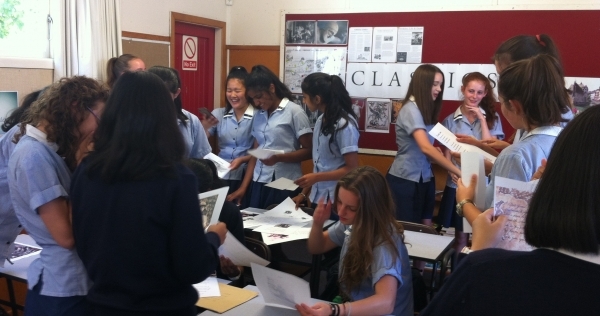Anne, Learning Languages Area Director at Epsom Girls Grammar School, saw the potential of participating in Shared Histories from the outset in October 2013. Anne answers three questions to outline here her students’ journey in developing both the project and their language skills
➔ Can you describe the impact of Shared Histories for you and your students?
The impact is remarkable. The project has allowed students to connect not only with the past but also to the future.
Our school began in 1917. As a result of the project we have read early school magazines which tell of the war efforts of the first students of our school. Some of those first students have great granddaughters now attending the school so the links have been poignant. Reaching forward to 2017, we have our school centenary so, because of the project, we now have a representative on the centennial committee and there will be a WW1 component to those centennial celebrations.
Also because of the project, our principal, Madeline Gunn, sent us to a WW1 collaboration meeting at Auckland Council and we were able to connect with the right people who gave funding to an Old Girl who had been campaigning for funds to repair and renew the WW1 memorial and gardens at Marivare Reserve on Ranfurley Road. That has now been actioned by the Council and four of our students will be taking part in the ANZAC ceremonies to be held there in the few days after our return from our trip to France this April. They will share the impact of the trip with those gathered to remember the fallen of our community.
Of course the lifelong friendships that are being forged by New Zealand and French students through the online communications, gifts and the trip we can only imagine. Those connections have been both with France and with Germany.
➔ Has the quality of your project exceeded your expectations?
I understand completely that the success of our project is due in large part to the staff in our French partner school. Such a great team (English teachers and Librarian) that we are dealing with. They have even been fundraising for our visit, which is humbling, so the generous gift of money from the French Embassy will be well received. The Wall of Remembrance designed by an artist and created by the students in France (as you can see by the entries on the webpages [LINKS]) is going to be a lasting memorial to our partnership. Such excellent quality!!! Definitely exceeded expectations.
What do you think are the key things students are learning from being involved?
I know that the French language students in the school have enthusiastically embraced the project as we have integrated different, level-appropriate elements into assessments from year 9 to 13. http://sharedhistories.com/what/projects/item/256-autre-regard-sur-la-guerre-lettres-de-la-terminale-l-lgt-gay-lussac Those tasks have allowed students to learn many facts about WW1 and to respond creatively to what they have learned. They have in the process learned new language, made new friends in France, connected with the Old Girls of our school community and with our community at large.
Technologies, in particular social networking platforms like Edmodo and the SharedHistories blog, have enabled students in France and New Zealand to communicate with each other in both languages and publish what they have been doing. Having real audience for their work has been motivating.
The symbolic care packages that have been sent back http://sharedhistories.com/what/projects/item/282-year-12-reading-the-gay-lussac-poetry and forth between the two schools have also been pertinent as students have learned to knit poppies (with much help from adults the school community because kids don’t learn how to knit these days!), they have purchased gifts (postcards, stamps, coins, kiwiana), written poems and painted plaques with the real French audience in mind. With great delight they have in turn opened the touching gifts of poetry, music, brochures etc from France. [link]
The impact of the trip cannot be underestimated. We are four weeks out from departure and everyone is getting very excited.
➔ What role have you, the teacher played? What feedback can you offer?
The staff at our school (one historian and four French language teachers) have largely been facilitators and administrators – setting up the assignments, the Edmodo sites, speaking at assemblies, attending meetings in the community, garnering support for and organising the trip, and doing the paperwork required to gain approval from French, German and New Zealand school systems to set up sister school arrangements which will ensure the project carries on out into the future.
It also needs to be acknowledged that our Principal has supported us all the way, asking us to present at assemblies, as have librarians who have kindly created displays of the contents of care packages for all the school to see and enjoy.
Feedback/advice to future schools wishing to facilitate such a project is to understand clearly the small window of time in which we have to communicate with schools in Europe given the mismatch between our holidays and theirs. It is also important to understand just how much such a project can snowball and how much commitment is involved to make it happen and especially to keep the momentum going for the duration. Having the project integrated into the assessment cycle across all levels has helped to keep us on track.
Latest from Pascale Hyboud-Peron
Media
Search
Who's Online?
The following members are online:
Latest Forum Posts
- No posts to display.
Powered by Technologywise / Design by yojodesign

